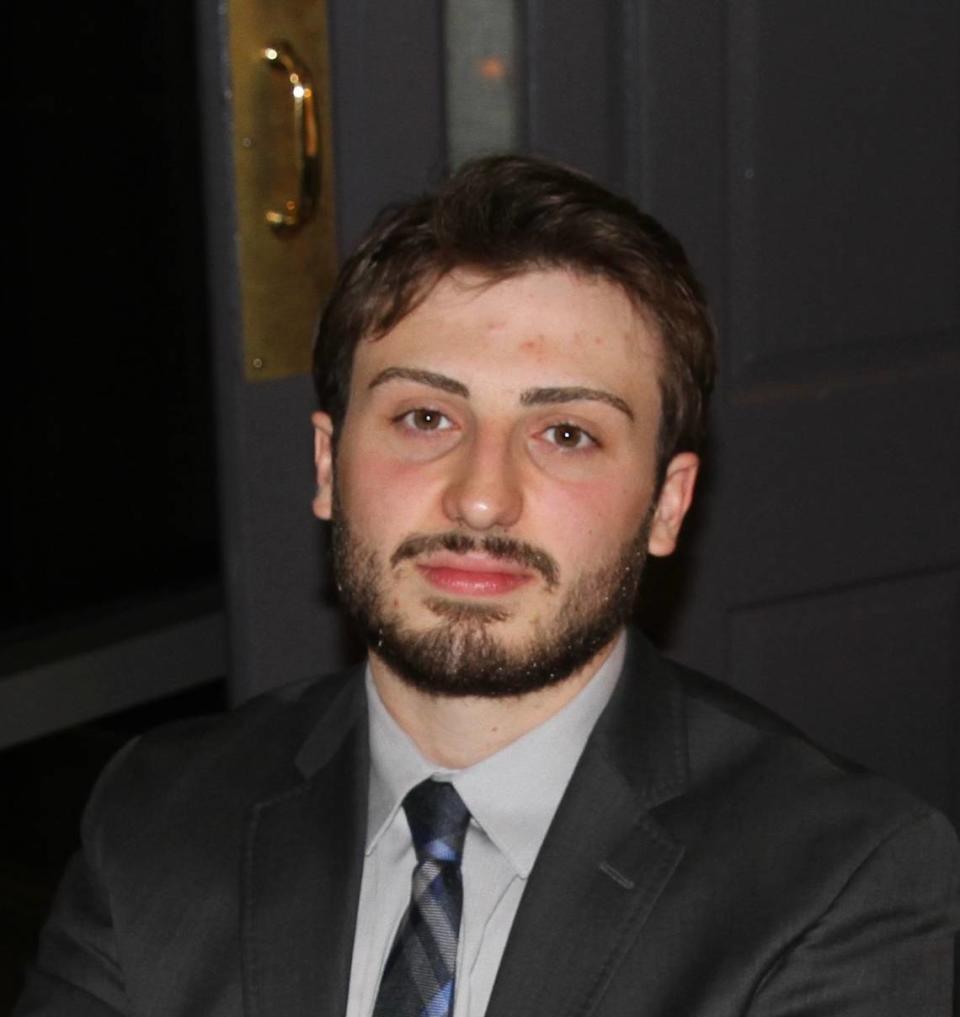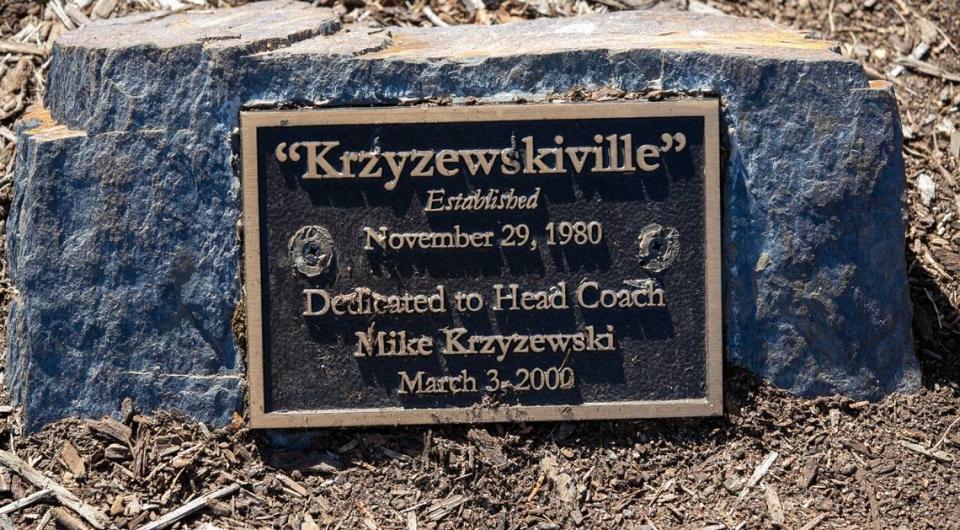Tenting in K-Ville: Paying for the Duke-UNC men’s basketball game with your well-being
This story was originally published in The Chronicle, the independent student news outlet at Duke University.
Feb. 25, 2022. 9 p.m. Durham
It’s 33 degrees on the weekend before men’s basketball coach Mike Krzyzewski’s final home game against North Carolina. Hundreds of Duke students stand outside of the beloved Cameron Indoor Stadium, celebrating the beginning of the last night of the 2022 tenting season. The air reeks of alcohol and vomit, and there are clear signs of exhaustion on the faces of all who have survived the tenting season.
The siren blares for the last tent check of the night, and our tent — the Super Gremlin Tent — scrambles to their check-in location. We pass the final check, let out a collective sigh of relief, and celebrate by snapping one last picture together. Stumbling back to the warmth of Hollows A, the group can finally relax.
We’ll be inside Cameron for Coach K’s final game, 41 years after his first.
The origins of Krzyzewskiville
The patch of grass outside Cameron became known as Krzyzewskiville, or K-Ville for short, in the 1986 season when 15 students decided they would set up tents days before tip-off of that season’s battle with the Tar Heels. They wanted to get ahead of the line that would typically begin on gameday.
By game time, there were over 75 tents. From there, tenting grew into a process that is now overseen by Duke Athletics and Duke Student Government, with a special committee of line monitors ensuring each tent group has followed the very particular rules to remain eligible for tickets.
The tradition has grown every year, and this year is no different. Tents have been in their usual place for the first UNC-Duke matchup of the season, set for Saturday, Feb. 4, at Cameron.
Sleeping in a tent for weeks to watch the greatest rivalry in college sports is something that few can relate to. From the outside, spectators see hundreds of students dedicating themselves to school spirit and enjoying each other’s company.
But on the inside, the process can be demanding and draining, pushing many to their breaking points. Over the years, tenting has evolved into an operation that can adversely affect the physical and mental health of its participants and those that have committed to overseeing it.

A dreary combination
The first night of the 2022 tenting season, I hadn’t yet received my insulated sleeping bag in the mail. I thought I’d try to tough out the night with a few extra layers and a blanket.
Tenters are given “grace” for the night if the temperature drops below 26, meaning they don’t have to sleep in the tent but can sleep in their dorms. But on this night in particular, the temperature consistently toed the line, and I was stuck awake all night, freezing.
Tent checks are called two, three, sometimes even four times per night by a blaring siren, coming at random times at the discretion of the line monitors. Students are forced to trudge over to the entrance of Cameron and stand in line while line monitors ensure that each tent has enough members there.
With each check called, I left my tent with no blanket to an even colder outside. By the time the night ended, I had spent most of it lying awake.
It is no surprise that a lack of sleep can negatively impact students. Sleep deprivation can lead to memory issues, trouble thinking, mood changes, weakened immunity and many more negative health effects. When you wake up multiple times a night, forced to stand out in the cold to pass your check, and then have to lie back in your sleeping bag completely still to ignore the freezing temperatures so you can rest, deprivation sets in fast.
The first Tuesday night of this year’s tenting season comes to mind as the perfect example. All 10 members of the Super Gremlin Tent were tucked into their sleeping bags when the night shift started at 1 a.m., ready to get whatever sleep they could.
But other tents around us did not have the same idea. The sounds of music, drinking games and karaoke filled the air around the tent, making it impossible to get rest. Hours ticked by, and the partying pushed on. By 4 a.m., all 10 of the Super Gremlins accepted the fact that we were getting no sleep that night.
This took a toll on me outside the village of tents. Last season, the floor of my room was covered in clothes. Layers upon layers of hoodies, long underwear, and socks were ready to go at a moment’s notice, just in case I had to cover someone’s shift. But I had no energy to function. My laundry basket was full, and my trash cans overflowed.
More than once, I elected to sleep through lectures just to catch up on a few of the many hours I had lost. My grades dropped and I fell behind. At one point, I had missed five classes in a row because I couldn’t fathom getting out of bed.
By the end of last season, I had spent over 55 day hours and 13 full nights inside of the tent.

The toll on academics
But it’s not just the sleep deprivation that gets to those who tent. The cold weather gets in the way of so much more.
Senior Grant Lyerly recounts his struggle. At times, he’d be working on problem sets and the cold would kill his laptop. Without his laptop, Lyerly was forced to work on his phone, where he had to remove his gloves just to type.
“Entering in complex equations on your phone when you can barely feel your fingers was painful,” he said. “More than once I just gave up and accepted the fact that my assignment would be turned in late.”
Like Lyerly, I also experienced the struggle of completing assignments in the cold. In order to survive the cold on my hands, I would type for 10 minutes, then try to warm up for 10 minutes. It was the only way I could actually get things done without being subject to an excruciating cold, which would greatly interfere with my focus. Because of these constant breaks, work took significantly longer to complete and began piling up.
At Duke, a school that takes pride in its academics more than basketball, those who choose to tent may struggle to keep up with the academic rigor.
The American Psychological Association explains how increasing stress levels can affect the body and the mind. For the body, stress can cause heart issues, trouble breathing, slower digestion, lower sexual desire and a response to danger. For the mind, stress can increase anxiety and depression, as well as make it even more difficult to sleep.
With up to 12 students in each of the 130 tents, about one-fifth of the student population could be experiencing these symptoms for several weeks.
While every tenter may not be affected by these issues in the same way, we can still expect that a large portion of the group suffers somehow. When I polled my own tent on their experience last year, the group unanimously agreed that tenting added a significant amount of stress to their lives.
Tenting in Duke’s Krzyzewskiville: Will the tradition stay after Coach K’s last game?
Tenting as a social opportunity — but at what cost?
In K-Ville, you can also expect to find students playing drinking games every Thursday, Friday and Saturday nights, all of them united in the fact that they have to spend the night outside. The drinking culture in K-Ville is strong and the alcohol is plentiful, with most tents keeping their own stack of 24-racks of beer. They’re used both as an escape from the stress of the week and an escape from the cold.
The Super Gremlin Tent is no exception. By the end of our three weeks in the tent during this season, the bill totaled over $300 in just alcohol expenses.
Running on very little sleep, weekends become unproductive. And, as you can imagine, that only piled on the stress.
The National Institute on Alcohol Abuse and Alcoholism classifies heavy drinking at more than 14 drinks a week for men and seven for women. For mainstays in K-Ville, alcohol consumption sometimes reached those numbers, putting our risk of health issues even higher.
A combination of sleep deprivation, stress and alcohol has caused a built-up resentment for the whole process.
As tenters’ tempers boil over, it gets taken out on those in charge of the process. The line monitors become the target of all of the grievances.
In last year’s K-Ville community group chat, line monitors were consistently made fun of. One in every five messages would refer to them as “Line Fraudetors.” Now, that’s not super creative, but the sentiment was clear: All of the grievances tenters experienced were seen as the fault of those above them.
But for the monitors, the process is just as difficult. One line monitor, in her second year in the role, told me how the organization becomes a target for participants’ anger.
“Being in the organization as a whole, you can definitely feel that sometimes. It’s hard because so many of [the tenters] don’t realize how much time we have to put into the process, too,” she said.
She explains that monitors, like tenters, have to dedicate hours of their lives every single day, estimating that a single, non-rivalry game can take up to seven hours of her time. So much of that time, she said, is dedicated to ensuring that the process is equitable to everyone.

Is it worth it?
I love K-Ville. My college life would not be the same without it. When I first applied to Duke, it was activities like tenting, and its community, that drew me in. I wanted a school where I could balance hard work with great athletics.
And, in all honesty, most of my favorite memories as a Blue Devil have taken place during the tenting season.
But most of my worst moments happened during that time, too. While it’s okay to celebrate the passion these Duke students bring to the table, it’s important to also acknowledge what many other tenters are thinking — that it is not without its many hardships.
Sam Mickenberg is a senior at Duke University.
From famous alums to why the schools are so close together, get to know Duke and UNC

 Yahoo Movies
Yahoo Movies 
